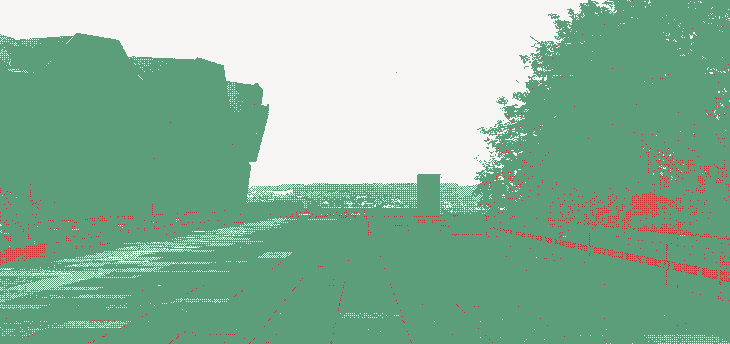
Lina Franken 📧
Dennis Möbus
The history of the Ruhr Area is documented in various artifacts. The corpus “Lebensgeschichte und Sozialkultur im Ruhrgebiet” (LUSIR) contains more than 300 oral history interviews, conducted between 1981 and 1988 in a project which researched experiences of fascism and the post-war period in the region. This forms a well-documented and digitized set of unique narratives. Within this case, we will have a closer look at this rich material, which is overwhelming in its breadth as well as depth. Therefore, we experiment with co-laborative approaches to computational methods, unfolding them in human-machine-interactions. Building on our insights from previous workshops (Franken/Möbus 2024; Egger/Franken/Möbus/Schmidt 2023), we propose an open format with STS scholars where collaborators can work with their own thematical as well as technical focus.
The aim of the case is twofold: while diving deep into meaning-making in the ruins of the area, we also aim to better understand epistemological changes that come with computational approaches within STS research. Together, we will examine where and how knowledge production is changing. For this purpose, we will explore methods from machine learning and artificial intelligence: Topic modeling, an unsupervised machine learning approach, provides thematical overviews, indexes and graphical representations of life story interviews (Möbus 2025). Generative AI even extends the possibilities of computational text analysis: summarization and short-biography creation already touches on the realm of interpretation (Bayerschmidt/Möbus/Vu 2025). Teaching the LLM to interpret interviews transcripts via prompt engineering opens a room for critical discussions about the practical, epistemological and ethical perspectives and limitations, hopes and fears, chances and dangers of computational methods in STS and beyond. Instead of delving into coding, we will close-read and analyze the outputs (Althage et al. 2024) regarding their possibilities and the agency they get within STS research.
Case participants will not only playfully explore the interplay between computational and manual steps in research, but also design workflows themselves and discuss the epistemological consequences. Open exploration is possible both in groups and in individual work, giving everybody the opportunity to organize themselves when forming groups and to orient towards common interests. The results of our prior workshops showed that computational approaches are promising for the start of exploring unknown data, but in-depth analysis is not to be neglected. An iterative process can immediately incorporate qualitative analyses. Appropriate functionalities in the Colab notebooks we use within the case allow scalable readings, switching between distant reading, interrogating generative AI and viewing specific text passages in close readings for content assessment on the fly.
No technical expertise or prior knowledge on the computational approaches used is needed. Case participants are asked to bring their own device (laptop, if possible) and to locally store the interviews before we meet in Bochum. Basis for the generous hands-on phases will be pre-configured Google Colabs in combination with LLMs hosted by together.ai. Accounts for both are required for active participation – you can create anonymous accounts and delete them afterwards, as a registration at together.ai comes with a sufficient amount of free credits. To provide a good support during the hands-on phases and to allow for close examination we will limit this case to a maximum of 25 participants. An online-pre-meeting (1-2 hours) to detail the scope and collect expectations from participants will be arranged for February 2026. The case is planned for 9-19h, so please block the whole day if you want to participate.
Please note that the interview transcripts are in German language.
Literature
Melanie Althage/Aline Deicke/Mark Hall/Dennis Möbus/Cindarella Petz/Melanie Seltmann (2024): Algorithmenkritik. In: Living Handbook digitale Quellenkritik. Online: https://dqk.uni-trier.de/.
Philipp Bayerschmidt/Dennis Möbus/Binh Vu (2025): Prompt-Engineering und Hermeneutik: Best Practices für die historische und qualitative Forschung. In: Nils Reiter et al. (Hg.): Under Construction: Book of Abstracts – DHd 2025, 61–64. Online: https://zenodo.org/records/15269143.
Nils Egger/Lina Franken/Dennis Möbus/Florian Schmid (2023). Oral History auf dem Weg zu Big Data: menschliche und maschinelle Annotation lebensgeschichtlicher Interviews im Vergleich. In: Anna Busch/Peer Trilcke (Hg.): Open Humanities – Open Culture. Book of Abstracts – DHd2023. DOI: 10.5281/zenodo.7715317.
Lina Franken/Dennis Möbus: Mensch und Maschine als Team. Exploratives Topic Modeling und manuelle Annotation in der qualitativen Sozialforschung. In: Zeitschrift für digitale Geisteswissenschaften 9 (2024). DOI: 10.17175/2024_003.
Dennis Möbus (2025): Interview Chronology Analysis (ICA): Verläufe von (lebensgeschichtlichen) Interviews visuell analysieren. In: Nils Reiter et al. (Hg.): Under Construction: Book of Abstracts – DHd 2025, 469–471. Online: https://zenodo.org/records/15269143.